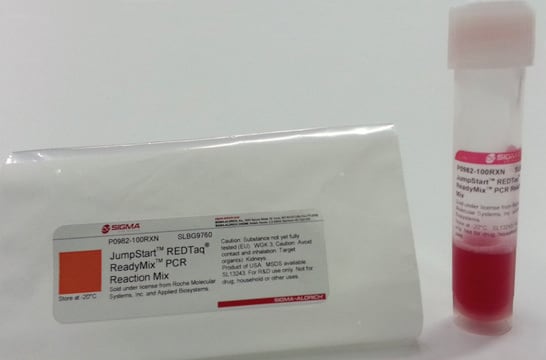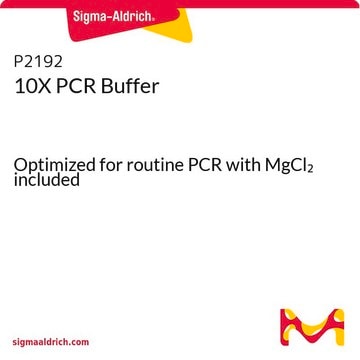R2523
REDTaq® ReadyMix™ PCR Reaction Mix
Complete PCR reagent with standard Taq DNA Polymerase and inert dye
Synonym(s):
PCR master mix, PCR master mix with loading dye, Taq PCR master mix
About This Item
Recommended Products
Quality Level
form
liquid
usage
sufficient for 100 reactions
sufficient for 20 reactions
feature
dNTPs included
hotstart: no
technique(s)
PCR: suitable
color
red
input
purified DNA
application(s)
agriculture
shipped in
wet ice
storage temp.
−20°C
General description
Application
- for routine polymerase chain reaction (PCR) amplification.
- for the PCR amplification of cDNA
- in semi-quantitative PCR
Features and Benefits
- Saves preparation time
- Reduces risk of contamination from multiple pipet steps and and increased reproducibility.
- Provides consistent reaction-to-reaction performance
- No loading buffer/tracking dye needs to be added. The PCR product is loaded directly into an agarose gel after amplification
- The red tracer migrates at approximately the same rate as a 125bp fragment (slightly faster than bromophenol blue)
- Amplifies targets up to 7 kb in length
- Because no loading buffer has been added, a sample can be easily re-amplifed such as in nested PCR.
- Stable at 4°C or −20°C.
- Ready-mix format reduces setup time.
Packaging
20RXN is packaged as 1 X 500 μL
100RXN is packaged as 1 X 2.5 mL
Preparation Note
Legal Information
related product
Storage Class Code
10 - Combustible liquids
Certificates of Analysis (COA)
Search for Certificates of Analysis (COA) by entering the products Lot/Batch Number. Lot and Batch Numbers can be found on a product’s label following the words ‘Lot’ or ‘Batch’.
Already Own This Product?
Find documentation for the products that you have recently purchased in the Document Library.
Customers Also Viewed
Articles
Colony PCR reagents and our colony PCR protocol using REDExtract-N-Amp™ PCR ReadyMix™ and JumpStart™ REDTaq® PCR ReadyMix™ reagents.
Explore PCR's history, from discovery to Nobel Prize. Discover real-time PCR (qPCR) and digital PCR developments.
Explore PCR's history, from discovery to Nobel Prize. Discover real-time PCR (qPCR) and digital PCR developments.
Explore PCR's history, from discovery to Nobel Prize. Discover real-time PCR (qPCR) and digital PCR developments.
Protocols
Reviews the applications and benefits for RedTaq, including standard RedTaq, Hot Start RedTaq and RedTaq for genomic DNA PCR.
Learn standard PCR protocol steps and review reagent lists or cycling parameters. This method for routine PCR amplification of DNA uses standard Taq DNA polymerase.
Our team of scientists has experience in all areas of research including Life Science, Material Science, Chemical Synthesis, Chromatography, Analytical and many others.
Contact Technical Service















